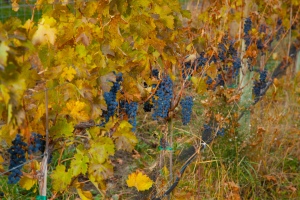I’m a nerd. I’m a wine nerd for that matter, and I’m constantly birthing new ideas and entertaining possible queries on how I can engage my readers with the beautiful and intriguing wonderful world of wine!
So I thought…
I’m going to write about the etymology of grape varietals and their names.
I soon realized that this was an undertaking. There are countless resources that explain about varietals, where they are cultivated, and what they smell & taste like in wine form. It was interesting to see how little there actually is on the origins and historical development of grapes! C’mon! Give a wine nerd a break! Here is what *cough* little I found. Onwards!
CHARDONNAY
The name “Chardonnay” is said to have come from the Latin-based word Cardonnacum. Technically speaking, Chardonnay is a place in eastern France – specifically a commune – in the Saône-et-Loire area of Burgundy. This is where the semantic origin of the Chardonnay grape comes from.
Resources:
http://en.wikipedia.org/wiki/Chardonnay,_Sa%C3%B4ne-et-Loire
http://www.etymonline.com/index.php?term=Chardonnay&allowed_in_frame=0
http://dictionary.reference.com/browse/chardonnay?s=t
RIESLING
There is not much known about the origin of the word “Riesling”. It is a German-based word (Rüssling), and it is said to have been discovered in the Rhine area of Germany. Unfortunately, the origin of the name is uncertain. There are some preserved notations dating from the mid 1400s which use the translated term in reference to vines.
Resources:
http://www.etymonline.com/index.php?allowed_in_frame=0&search=riesling&searchmode=none
http://en.wikipedia.org/wiki/Riesling
CABERNET
The term “cabernet” corresponds to a family of grapes. It’s origin is purely French, and Cabernet Sauvignon has been used in English since the mid 1800s. Cabernet essentially is in the same boat as Riesling; its actual etymology is obsure. However, the term is of Medoc dialect, which makes sense considering the Medoc is part of Bordeaux and Cabernet is highly grown in the Medoc. One interesting website (www.tellmewinetv.com) mentioned that “cabernet” comes from the Latin term “caput” which essentially translates into “black vine.”
Resources:
http://www.etymonline.com/index.php?search=Cabernet+Sauvignon+grape
http://www.tellmewinetv.com/2010/04/06/what-is-the-origin-of-the-word-cabernet-episode-34/2010/
http://dictionary.reference.com/etymology/cabernet
SHIRAZ & SYRAH
This was one of the most interesting finds; it seemed to have two different meanings despite being the exact same grape. The term “shiraz” derived from the name of a district in 1630s Persia that made wine. On the other hand, the term “syrah” is purely French, deriving from a grape varietal that is grown in southern France, but has only been “recorded” since the early 20th century.
Resources:
http://www.etymonline.com/index.php?allowed_in_frame=0&search=syrah&searchmode=none
ZINFANDEL
Again, one of those situations where the origin of the name is unknown. Sad face. Apparently the grape name has been floating around North America since the late 19th century, however, recent discoveries have led scientists to figure out that zinfandel is a direct DNA clone of Primitivo from Puglia, a region in Italy. It is also, according to wikipedia, “genetically equivalent to the Croation grapes Crljenak Kaštelanski and as well as Tribidrag” (see here for reference).
Resources:
http://en.wikipedia.org/wiki/Zinfandel
http://www.etymonline.com/index.php?allowed_in_frame=0&search=zinfandel&searchmode=none
PINOT
The word “pinot” comes from an “American English variant spelling of French pineau (attested in English from 1763)”. Pinot is similar to Cabernet in that it is a label placed upon a family of grapes. The French word “pineau”, when broken down from root and suffix, is from “pin ‘pine tree’ […] + diminutive suffix -eau”. This name was fitting due to the shape that the grape bunches take on, as they resemble pine cones. Within the Pinot family are a number of varieties including the white grapes Pinot Gris and Pinot Blanc, and the red grapes Pinot Noir and Pinot Meunier.
Resources:
http://www.etymonline.com/index.php?allowed_in_frame=0&search=pinot&searchmode=none
Frustrating as it may be, my search is not over. I very much enjoy learning about the etymology of words, and if I ever come across a really good book on this stuff, I’ll be sure to share my findings. On that note, if anyone knows of one, I’d love to know! It was still neat to learn a bit more about each varietal name, despite the amount of info I found. I did learn one thing though: grapevines have been around a lot longer than we have documented sources for, and that, my dear friends, is pretty darn neat.
Cheers!


